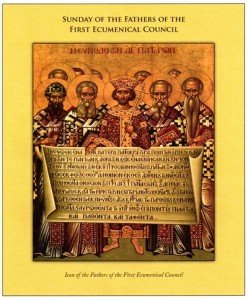 On the weekend between the feasts of Ascension and Pentecost, our Church remembers the Fathers of the First Ecumenical Council which took place in 325 CE, the Council of Nicaea. This first Council of the entire Christian Church began the process of finding words to express some of our most fundamental beliefs: How do we describe Who Jesus IS and How do we describe Who God IS.
On the weekend between the feasts of Ascension and Pentecost, our Church remembers the Fathers of the First Ecumenical Council which took place in 325 CE, the Council of Nicaea. This first Council of the entire Christian Church began the process of finding words to express some of our most fundamental beliefs: How do we describe Who Jesus IS and How do we describe Who God IS.
This Council also began the process of formulating a statement of our beliefs, that is the Nicene Creed. Until this time the Church did not have an adequate theology and vocabulary to express its beliefs. The Fathers of the Council drew upon Greek Philosophy to find the right words to first express the universal Church’s orthodox belief about Jesus, the Christ.
Interestingly enough, the Gospel assigned for this weekend is taken from John’s seventeenth chapter wherein he expresses the “completion” of Jesus’ work and shares Jesus’ final prayer for His disciples. The early Church added this statement to John’s Gospel: “Eternal life is this: to know you, the only true God, and him whom you have sent, Jesus Christ.” This phrase, I believe, offers us a much different concept of eternal life than is typically accepted by many Christians.
Interestingly, our Epistle reading provides us with the final thoughts of Paul to the Church he helped establish at Ephesus. This passage in Acts deserves, I believe, our reflection. Paul says: “I commend you now to the Lord, and to that gracious word of His which can enlarge you, and give you a share among all who are consecrated to Him”. Again we hear of the power of the word of God, namely Jesus, to change our lives and to help us discover the meaning and purpose of life. This strengthens the words that John attributes to Jesus: “I entrusted to them the message you entrusted to me, and they received it. They have known that in truth I came from you, they have believed it was you who sent me.”
If we truly believe that Jesus is not only truly God but also truly man, we will accept the fact that God, through Him, shared with us how to live this earthly life. When we embrace the Way of Jesus and attempt to grow in His likeness, we will discover the meaning and purpose of our lives. While we cannot accomplish this on our own, we have been assured by God that He will help us if we desire to imitate Christ.
